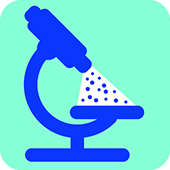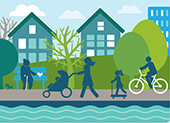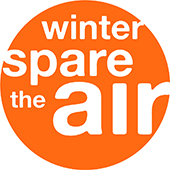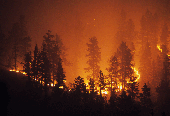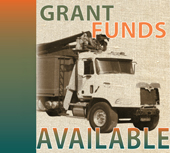|
|

|
|
|
|
November 2019 l Volume 2019-4
|
|
|
|
|
|
|
In this issue, you’ll find articles about the Air District Advisory Council's PM Conference, the newly adopted West Oakland Clean Air Plan, the start of Winter Spare the Air season and the expansion of the Clean Cars for All program throughout the Bay Area. Other articles cover an upcoming workshop for a set of amendments designed to prepare for and protect the public from wildfires, and a call for applications for the Spare the Air Leadership Award. A summary of current grant opportunities is also included.
|
|
|
|
|
|
|
|
|
|
|
|
|
|
Gina McCarthy keynote speaker at PM: Spotlight on Health Protection
|
|
| | |
|
On October 28, the Bay Area Air District’s Advisory Council meeting, PM: Spotlight on Health Protection, brought together leading health and science researchers for the first symposium in a series at the Bay Area Metro Center. The keynote speech was delivered by Harvard professor and former EPA Administrator Gina McCarthy, one of the nation’s most respected voices on the environment and public health.
Other speakers included:
- Dr. John Balmes, Professor of Medicine at UC San Francisco where he is on the faculty of the Divisions of Occupational and Environmental Medicine and Pulmonary and Critical Care Medicine.
- Dr. H. Christopher Frey, the Glenn E. Futrell Distinguished University Professor of Environmental Engineering in the Department of Civil, Construction, and Environmental Engineering at North Carolina State University.
- Dr. Scott Jenkins, senior environmental health scientist in EPA's Office of Air Quality Planning and Standards.
- Michael T. Kleinman, UC Irvine Professor of Environmental Toxicology and Co-Director of the Air Pollution Health Effects Laboratory in the Department of Community and Environmental Medicine, Adjunct Professor in College of Medicine.
- Julian Marshall, the Kiely Endowed Professor of Environmental Engineering at University of Washington with a focus on air quality management.
- Phil Martien, Director of the Assessment, Inventory, & Modeling Division at the Bay Area Air Quality Management District.
- Jason Sacks, Senior Epidemiologist in the Center for Public Health & Environmental Assessment within U.S. EPA’s Office of Research and Development.
- Lauren Zeise, Ph.D., appointed by Gov. Brown as Director of the California Office of Environmental Health Hazard Assessment in December 2016, with OEHHA since its inception in 1991.
Increasing evidence shows health impacts from particulate matter, or PM, can occur well below the current national ambient air quality standards. As impacts in our communities increase with our changing climate, it is important that we reassess the health effects of PM.
This year, the Air District’s Advisory Council will be convening a four-part conference series on PM to facilitate a discussion among nationally recognized scientists, stakeholders, and the Air District to identify the most effective measures to further protect public health. The symposia will shine a spotlight on this public health challenge and share information and tools to inform future policy decisions.
|
|
|
|
|
|
|
|
|
|
|
|
|
Air District Board Approves Community Action Plan to Improve Air Quality in West Oakland
|
|
| | |
|
In October, the Air District’s Board of Directors voted unanimously to approve the community action plan, Owning Our Air: The West Oakland Community Action Plan, co-authored by the Air District and the West Oakland Environmental Indicators Project. Owning Our Air lays out a series of strategies and measures to be implemented over the next five years by state, regional and local agencies to further air pollution reductions in West Oakland.
The next step in the community action plan process will be a public hearing of the California Air Resources Board held in West Oakland on December 5, 2019, to consider the plan and its approval.
West Oakland is bounded by the Port of Oakland, the Union Pacific rail yard and the I-580, I-880 and I-980 freeways. Elevated levels of air pollution in West Oakland are the result of concentrated industrial activity including maritime freight, a rail yard and rail lines, large distribution centers, cement and asphalt plants, a power plant, metal facilities and small to medium industrial and manufacturing operations. Trucks, cars and the road dust they generate also contribute to elevated emission levels.
The plan was developed as a requirement of AB 617, a state law passed concurrently with re-authorization of California’s cap-and-trade program, the centerpiece of the state’s efforts to reduce climate change. AB 617 recognizes that while California has seen tremendous improvement in air quality, not all communities have benefited equally, and some communities located close to freeways, ports, industry or other large pollution sources need additional focus and resources to reduce exposure levels.
A copy of the Owning Our Air plan, a plan summary and appendices can be viewed and downloaded online.
|
|
|
|
|
|
|
|
|
|
|
|
|
Winter Spare the Air Season Starts November 1
|
|
| | |
|
The 2019-2020 Winter Spare the Air season begins Friday, November 1, and runs until February 29. Winter Spare the Air Alerts are called when air quality is forecast to be unhealthy due to fine particulate pollution, primarily from wood smoke. When an alert is in effect, it is illegal to burn wood, manufactured fire logs or any other solid fuel, both indoors and outdoors in the Bay Area for a full 24-hours during the Winter Spare the Air season.
During PG&E Public Safety Power Shutoffs, or other loss of electricity or gas service, there is an exemption that allows wood burning when there is no alternate form of heat available. However, wood burning is discouraged during PSPS events because it coincides with increased fire risk and often with wildfires, adding more air pollution when levels may already be high.
Like wildfire smoke, wood smoke contains carcinogenic substances, such as particulate matter and carbon monoxide, which are harmful when inhaled. Exposure to wood smoke has been linked to serious respiratory illnesses and increased risk of heart attacks. The fine particulate pollution in wood smoke is especially harmful for children, the elderly and those with respiratory conditions.
The Air District is proposing an amendment to its wood burning regulation to further protect the health of Bay Area residents when wildfire smoke impacts the region. The Air District’s Board of Directors will vote on the proposed amendment on November 20, 2019.
Cold temperatures and calm winds trap smoke from household wood burning around homes and increases fine particulate pollution build up inside and outside residences. Natural gas, propane or electric fireplaces are allowed during Winter Spare the Air Alerts.
Bay Area residents can find out if a Winter Spare the Air Alert is in effect by:
First-time violators of the Wood Burning Rule are encouraged to take a wood smoke awareness course to learn more about the health impacts from wood smoke and the weather conditions that lead to unhealthy air quality in the winter. Those violators who choose not to take the course will receive a $100 ticket. Ticket amounts increase for any subsequent violations.
There are also year-round prohibitions on excessive smoke and burning garbage and other harmful materials like junk mail, plastic, wood pallets and more in fireplaces and woodstoves. Residents concerned about wood smoke pollution may call 1-877-4NO-BURN or visit www.baaqmd.gov to file a complaint or to get more information.
|
|
|
|
|
|
|
|
|
|
|
|
|
Air District Expands Clean Cars for All Grant Program
|
|
| | |
|
The Air District’s Clean Cars for All grant program has expanded to all Bay Area zip codes. Income qualified residents who own a model year 2004 or older vehicle can receive up to $9,500 to retire their old vehicle and purchase a new or used electric vehicle. Incentive options vary depending on income and zip code.
The program was previously limited to designated communities but is now available to residents living in all areas under the Air District’s nine-county jurisdiction. More than 100 families have benefited from the program since its launch in March 2019. Many residents that received the full $9,500 grant were able to purchase a used electric vehicle using just the grant.
The Air District launched Clean Cars for All as part of a broad effort to ensure clean air vehicles are affordable options for residents across the Bay Area. Equitable access to clean air vehicles also ensures that all Bay Area residents benefit from lower fuel and maintenance costs as well as the improved driving experience.
The amount of money received from the Clean Cars for All program is based on the household size, income and choice of replacement vehicle. Additionally, up to $2,000 in funding is available for home charging equipment and installation.
Applicants must live in the Air District’s jurisdiction and their household income must fall under a specified limit based on their household size. Furthermore, the vehicle to be scrapped must be at least fifteen years old, functional and with current registration in the applicant’s name. Bay Area residents may check the program website or complete an application to verify their eligibility for the program.
For more information or to apply for Clean Cars for All, visit www.baaqmd.gov/cleancarsforall.
Clean Cars for All is part of California Climate Investments, a statewide program that puts billions of cap-and-trade dollars to work reducing greenhouse gas emissions, strengthening the economy and improving public health and the environment — particularly in disadvantaged communities.
|
|
|
|
|
|
|
|
|
|
|
|
|
Air District Board to Consider Adoption of Wildfire Safety Program Rule Amendments
|
|
| | |
|
On Wednesday, November 20, the Board of Directors of the Air District will conduct a public hearing to consider adoption of proposed rule amendments to Regulation 5: Open Burning and Regulation 6: Particulate Matter and Visible Emissions, Rule 3: Wood Burning Devices. The proposed amendments are part of the Air District’s Wildfire Air Quality Response Program, which is designed to prepare for, prevent and respond to future wildfires and to ensure that health-protective measures and strategies are in place.
The proposed amendments to Regulation 5 complement statewide efforts to prevent catastrophic wildfires through the practice of prescribed burning. These proposed amendments would exempt public agencies from incurring Open Burning Fees when conducting prescribed burns for the purpose of wildfire prevention.
The proposed amendments to Rule 6-3 aim to further protect public health when wildfire smoke affects air quality in the Bay Area. The proposed amendments would allow the Air District to announce a Spare the Air Alert year-round when particulate matter is forecast to exceed 35 micrograms per cubic meters.
The hearing will be held at the following location and time:
Bay Area Metro Center
Air District Headquarters Board Room, 1st floor
375 Beale St., San Francisco
Wednesday, November 20
9:30 AM
If you cannot attend this public hearing, the archived video will be made available on the Regulation 5 and Rule 6-3 pages under the Rules Under Development section of the Air District's website.
|
|
|
|
|
|
|
|
|
|
|
|
|
Air District Calls for Applications for Spare the Air Leadership Award
|
|
| | |
|
The Air District is announcing a call for applications for the Spare the Air Leadership Award.
For the fourth year in a row, the Air District is sponsoring this award in conjunction with Acterra and the 2020 Acterra Business Environmental Awards. The Spare the Air Leadership Award will be given to a public agency, private business, non-profit or school that has demonstrated significant leadership for a Bay Area air quality improvement project.
Project focus areas could include reducing air pollutants or greenhouse gases, devising pollution prevention strategies or developing innovative approaches to cleaner air. Public agencies, private businesses, non-profits or schools located within the Air District’s nine-county jurisdiction are encouraged to register and apply for the Spare the Air Leadership Award.
The award will be featured at the upcoming 2020 Acterra Business Environmental Awards ceremony, one of the Bay Area's oldest and most prestigious environmental recognition programs. The awards honor the accomplishments of organizations with innovative sustainable programs and recognize environmental leaders by providing an educational forum that increases awareness and the adoption of sustainable operating practices.
Applications for the awards are now being accepted online at www.acterra.org/bea. The final deadline to apply is December 6, 2019. For more information, visit www.acterra.org/bea.
|
|
|
|
|
|
|
|
|
|
|
|
|
Air District Offers Millions in Grants
|
|
| | |
|
The Air District administers a number of grant funding programs that offer incentives for clean air projects. Grant Programs Currently Open:
For public agencies and business:
Equipment/Engine Replacement/Repower or Conversion and Infrastructure
- Community Health Protection Grant Program – $40 million (M) is available for eligible projects that reduce toxic air emissions and ozone-forming pollutants from mobile and stationary sources by replacing old, high-polluting vehicles and equipment. Priority is given to projects in the AB 617-identified communities of West Oakland, Richmond-San Pablo, East Oakland/San Leandro, Eastern San Francisco, Pittsburg-Bay Point area, San Jose, Tri-Valley area, and Vallejo. Community input will play an important role by informing the Air District’s project outreach and project identification processes. Applications are being accepted on a first-come, first-served basis until all funds are awarded to owners of eligible equipment and vehicles by June 2020. www.baaqmd.gov/ab617grants
- Carl Moyer Program –$10M is available for eligible projects that upgrade or replace on-road vehicles, school buses, transit buses, off-road and agricultural equipment, marine equipment, and locomotives. Applications are being accepted on a first-come, first-served basis until all funds are awarded. www.baaqmd.gov/moyer
Lower-Emission School Bus Program – Funding is available for public school districts, Joint Powers Authorities (JPAs), and contracted fleets in the Bay Area to do bus replacements, engine repowers or electric conversions, natural gas tank replacements, and electric charging & alternative fueling infrastructure projects. Applications are being accepted on a first-come, first served basis until all funds are awarded. www.baaqmd.gov/lesbp
Vehicle Trip Reduction Grant Program – Approximately $3.5M is available for eligible transportation services and bicycle facility projects that improve air quality and reduce greenhouse gas emissions by reducing single-occupancy vehicle trips. Applications are being accepted on a first-come, first-served basis until all funds are awarded. www.baaqmd.gov/tripreduction
West Oakland Zero-Emission Grant Program - Approximately $450,000 in Reformulated Gas Settlement Funding (RFG) is available to help owners and operators pay for a portion of the cost to purchase and deploy new on- and off-road zero-emission vehicles, infrastructure, and mobile and stationary equipment that will be operated and installed in West Oakland or the adjacent Air District designated Community Air Risk Evaluation (CARE) areas of Richmond and Western Alameda County. Applications being accepted on a first-come, first-served basis until all RFG funds are awarded. www.baaqmd.gov/WestOaklandZEV
Climate Tech Finance Program – The Climate Tech Finance program offers subsidized financing for Bay Area facilities to adopt emerging technologies that reduce greenhouse gas emissions. Public facilities can apply for loans ranging from $500,000 to $30 million, up to 30-year terms. Small businesses can apply for loan guarantees of up to 90%. This program is open and accepting applications now. www.baaqmd.gov/ctf
Programs for residents:
Light-Duty Vehicle Replacement – The Clean Cars for All Program provides incentives for low income households (up to 400% of the Federal Poverty Level) in disadvantaged communities to retire older, high-polluting vehicles and replace them with a newer, cleaner vehicle or with alternative transportation options (e.g. Clipper card). Eligible vehicles for purchase or lease include hybrid electric, plug-in hybrid, or electric vehicles. This program is open and accepting applications now: www.baaqmd.gov/cleancarsforall
Passenger Car and Light-Duty Truck Retirement – The Vehicle Buy Back Program pays Bay Area residents $1,000 per vehicle to turn in their operable, registered, older passenger car or light-duty truck for scrapping. Eligible vehicles are model year 1996 and older. www.baaqmd.gov/vbb
Wood Smoke Reduction Incentive Program – Funding is available for eligible homeowners to help offset a portion of the cost to replace older, highly polluting fireplaces and wood-burning stoves with qualifying cleaner heating devices, including electric heat pumps and natural gas or propane heating stoves and inserts. Funding is also available to help homeowners decommission their existing wood-burning devices. Funding is limited to residents whose homes are located in eligible areas, including Air District designated CARE areas and high wood smoke areas. www.baaqmd.gov/woodsmokegrant
Volkswagen (VW) Environmental Mitigation Trust
The Volkswagen (VW) Environmental Mitigation Trust provides about $423 million for California to mitigate the excess nitrogen oxide (NOx) emissions caused by VW's use of illegal emissions testing defeat devices in certain VW diesel vehicles. The Trust provides funding opportunities for specified eligible actions that are focused mostly on "scrap and replace" projects for the heavy-duty sector, including on-road freight trucks, transit and shuttle buses, school buses, forklifts and port cargo handling equipment, commercial marine vessels, and freight switcher locomotives. The Zero-Emission Transit, School, and Shuttle Buses program is now open and accepting applications. http://vwbusmoney.valleyair.org.
Solicitations for other VW funding programs are anticipated to open in phases later this year and early 2020. https://ww2.arb.ca.gov/our-work/programs/volkswagen-environmental-mitigation-trust-california
|
|
|
|
|
|
|
|
|
|
|


